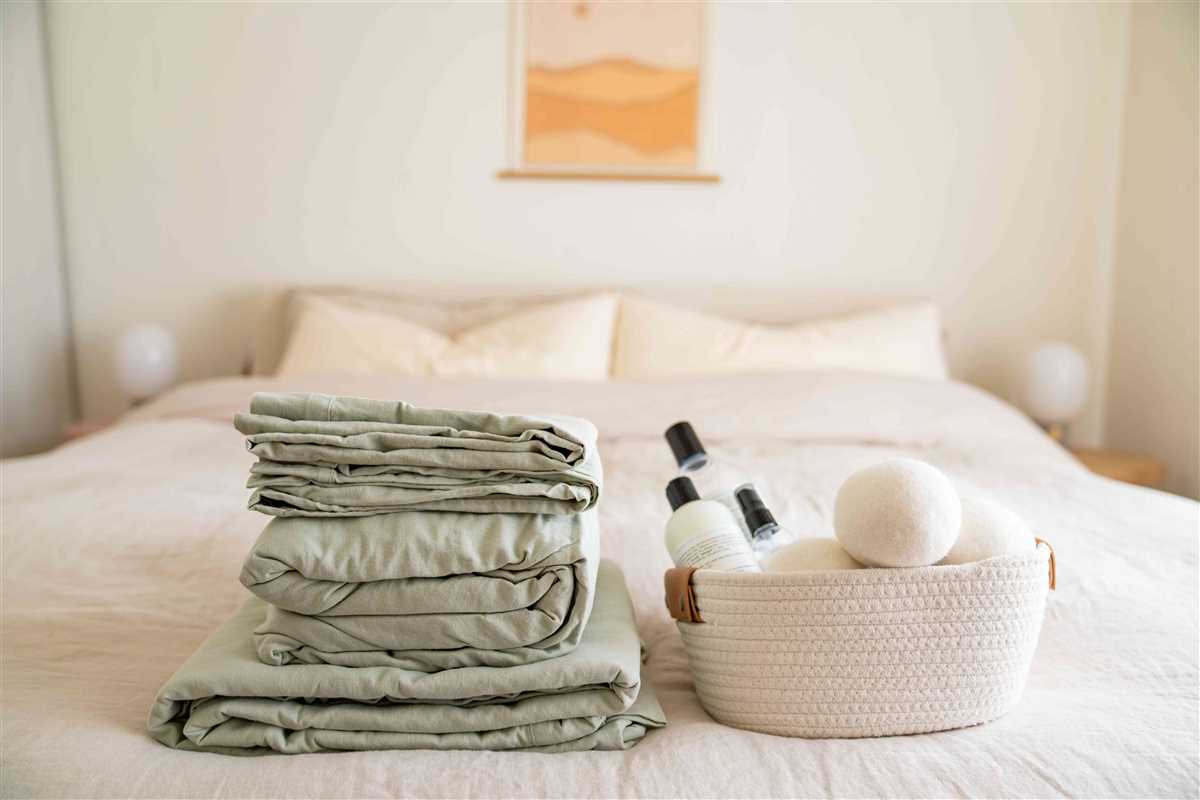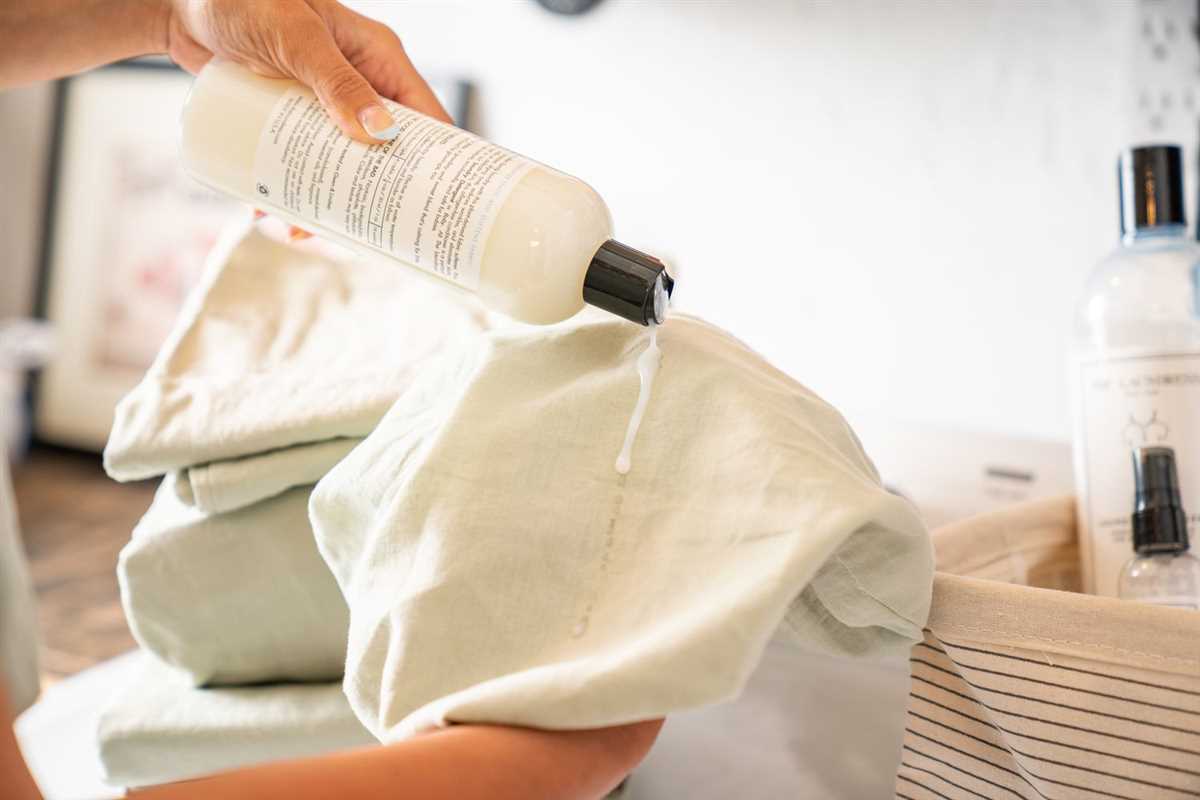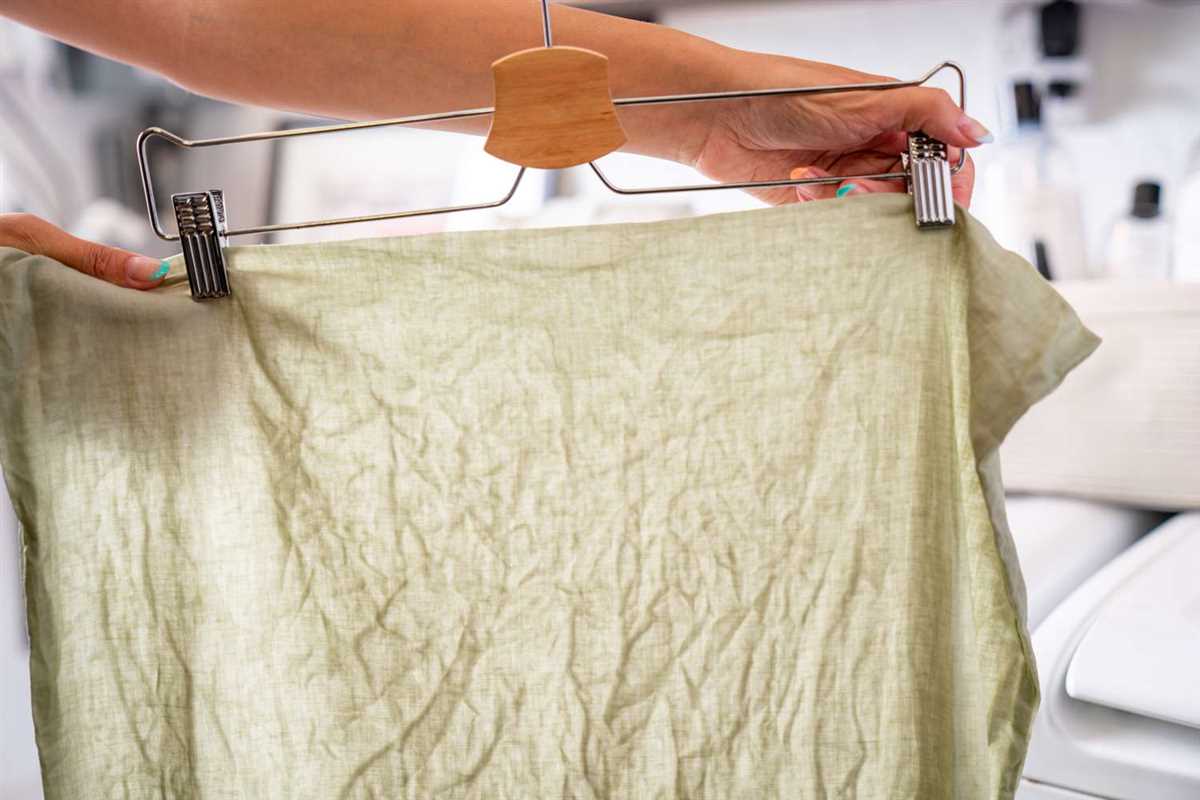




One of the joys of buying new bedding is the feeling of luxury and freshness that it brings to your bedroom. However, many people wonder whether it is necessary to wash new bedding before using it. While the packaging may claim that the bedding is ready to use, there are several reasons why washing it before use may be a good idea.
Firstly, new bedding often contains chemicals and dyes from the manufacturing process. By washing the bedding before use, you can eliminate any potential irritants and remove any lingering odor from these chemicals. This is especially important for individuals with sensitive skin or allergies.
Secondly, washing new bedding helps to remove any dirt, dust, or debris that may have accumulated during the manufacturing and packaging process. Even if the bedding appears clean, there may still be microscopic particles present that could affect your sleep quality and overall comfort.
“Washing new bedding before use can help eliminate any potential irritants and remove any lingering odor from manufacturing chemicals.”
Lastly, washing new bedding can help to soften the fabric and improve its overall feel. Some bedding may come out of the packaging feeling stiff or rough, but a quick wash can help to relax the fibers and make it more comfortable to sleep in.
Overall, while it may be tempting to use new bedding straight out of the package, taking the extra step to wash it before use can have several benefits. It can help eliminate potential irritants, remove any dirt or debris, and improve the overall comfort of the bedding. So, the next time you buy new bedding, consider giving it a quick wash before enjoying its luxurious feel in your bedroom.
Benefits of Washing New Bedding

-
Purify and freshen the fabric: Washing new bedding helps to remove any residual chemicals or processing agents that may be present from the manufacturing process. This helps to purify the fabric and eliminate any potential irritants or allergens.
-
Improve comfort: Washing new bedding can soften the fabric and make it more comfortable to sleep on. It helps to remove any stiffness or roughness associated with new bedding.
-
Enhance the quality of sleep: Clean and fresh bedding can contribute to a better night’s sleep. The removal of any chemicals or residues ensures that you are not exposed to any unpleasant odors or substances that could disrupt your sleep.
-
Prevent skin reactions: Washing new bedding can help to remove any potential irritants or allergens that could cause skin reactions. This is particularly important for individuals with sensitive skin or allergies.
-
Maintain hygiene: Washing new bedding helps to eliminate any dirt, dust, or other contaminants that may have accumulated during the manufacturing, packaging, or transportation of the bedding. This helps to ensure that your bedding is clean and hygienic.
-
Prevent color transfer: Some new bedding may bleed or transfer color when it comes into contact with moisture, such as sweat. Washing new bedding can help to eliminate any excess dye and prevent color transfer onto your body or other bedding.
It is generally recommended to wash new bedding before using it to reap these benefits and ensure that your bedding is clean, fresh, and comfortable for use.
Hygiene Considerations

- Bacteria and Germs: Even though new bedding may appear clean, it is always a good idea to wash it before use. During the manufacturing process and packaging, bedding can come into contact with bacteria and germs. Washing the bedding before use helps to eliminate any potential pathogens.
- Allergens: New bedding, especially if it is made of natural materials like cotton or wool, may have residual allergens such as dust mites, pet dander, or pollen. Washing the bedding can help remove these allergens, reducing the risk of allergic reactions.
- Chemicals: Some new bedding may have been treated with chemicals like flame retardants or pesticides. Washing the bedding can help remove these chemicals, making it safer for use.
- Odors: New bedding may have a strong odor due to the manufacturing process or packaging. Washing the bedding can help remove any unpleasant smells, making it more enjoyable to use.
It is important to follow the care instructions provided by the manufacturer when washing new bedding. Different materials may require different washing methods and temperatures. In general, using a gentle cycle and mild detergent is recommended to avoid damaging the fabric. Additionally, it is advisable to wash new bedding separately from other laundry items to prevent color transfer.
By washing new bedding before use, you can ensure that it is clean, fresh, and free from potential allergens or harmful chemicals, promoting better sleep and overall hygiene.
Allergies and Sensitivities

If you have allergies or sensitivities, it is especially important to wash new bedding before using it. New bedding often contains chemicals and dyes that can trigger allergic reactions in sensitive individuals. Washing your bedding before use can help to remove these irritants and reduce the risk of an allergic reaction.
In addition to chemicals and dyes, new bedding may also harbor dust mites, pollen, and other allergens. These allergens can accumulate during the manufacturing and packaging process, as well as during storage and transportation. Washing your bedding can help to eliminate these allergens, making your sleeping environment healthier and more comfortable.
Even if you don’t have specific allergies or sensitivities, washing new bedding is still a good practice. It can help to remove any dirt, dust, or residue that may be present on the fabric. Washing also allows the bedding to become softer and more comfortable, ensuring a better night’s sleep.
To wash new bedding, follow the manufacturer’s instructions for care. Use a gentle detergent, and consider using a hypoallergenic option if you have allergies or sensitivities. Wash bedding in hot water to kill any dust mites or allergens, and tumble dry on a low heat setting or hang to air dry.
Product Care and Longevity

Proper care and maintenance of your bedding can greatly contribute to its longevity. By following these tips, you can ensure that your new bedding stays fresh and comfortable for years to come.
Washing Instructions
Before using your new bedding, it is recommended to wash it to remove any residual chemicals or dirt that may be present. Check the care instructions provided by the manufacturer to determine the best washing method for your specific bedding.
Generally, it is best to wash bedding in cold or warm water on a gentle cycle. Use a mild detergent that is free from harsh chemicals or additives, as these can damage the fabric over time.
It is important to avoid overloading your washing machine, as this can cause excessive friction and damage to the fabric. Additionally, consider using a laundry bag to protect delicate fabrics and prevent them from getting tangled or stretched during the washing process.
Drying and Ironing
After washing, carefully remove your bedding from the machine to prevent wrinkles. Shake out each piece and smooth out any wrinkles by hand before drying.
When drying your bedding, it is best to air dry whenever possible. Hang it on a clothesline or lay it flat on a clean surface to dry naturally. This method helps to reduce shrinkage and prolong the lifespan of your bedding.
If you choose to use a dryer, set it to a low heat setting to minimize the risk of damage. Avoid over-drying, as this can weaken the fabric fibers and cause shrinkage.
If your bedding needs ironing, follow the manufacturer’s instructions for the appropriate ironing temperature. Use a low or medium heat setting and iron the fabric gently to avoid scorching or burning it.
Storage

When not in use, it is important to store your bedding properly to protect it from dust, pests, and moisture. Consider using a breathable storage bag or airtight container to keep your bedding fresh and clean.
Before storing, ensure that your bedding is completely dry. Moisture can lead to mold and mildew growth, which can cause irreversible damage to the fabric.
Store your bedding in a cool, dry place away from direct sunlight to prevent fading or discoloration. Keep it away from any sharp objects or rough surfaces that can snag or tear the fabric.
Frequency of Cleaning
Regularly cleaning your bedding is important to maintain its freshness and hygiene. Bedding should be washed every one to two weeks, or more frequently if needed, to remove any sweat, oils, or allergens.
However, it is important to note that over-washing can also cause damage to the fabric. Balance the need for cleanliness with the need to preserve the lifespan of your bedding.
Follow these care tips and your new bedding will not only look and feel great but also last for years, providing you with a comfortable and cozy sleep environment. Sweet dreams!
FAQ
Do I need to wash new bedding before using it?
While it is not absolutely necessary to wash new bedding before using it, it is generally recommended. Washing new bedding removes any chemical treatments or residues that may be present, improves the softness and comfort of the fabric, and helps to remove any dust or allergens that may have accumulated during storage or transportation.
What are the benefits of washing new bedding before use?
Washing new bedding before use has several benefits. Firstly, it helps to remove any chemical treatments or residues that may be present on the fabric, making it safer to use. Secondly, washing improves the softness and comfort of the bedding, ensuring a more pleasant sleeping experience. Lastly, washing helps to remove any dust, dirt, or allergens that may have accumulated on the bedding during storage or transportation.
Can I use new bedding without washing it?
Yes, you can use new bedding without washing it. However, it is generally recommended to wash new bedding before use. Washing helps to remove any chemical treatments or residues that may be present, improves the softness and comfort of the fabric, and helps to remove any dust or allergens that may have accumulated on the bedding.
Will washing new bedding ruin it?
No, washing new bedding will not ruin it. In fact, washing new bedding can improve the softness and comfort of the fabric. However, it is important to follow the care instructions provided by the manufacturer and use appropriate washing techniques to ensure that the bedding retains its quality and durability.
What is the best way to wash new bedding?
The best way to wash new bedding depends on the specific fabric and care instructions provided by the manufacturer. In general, it is recommended to wash new bedding using a gentle cycle with mild detergent. It is also important to wash bedding separately from other items to prevent damage and to avoid using bleach or harsh chemicals that may affect the fabric. Follow the care instructions and recommendations provided on the bedding’s packaging or labels for the best results.
Should I wash new bedding before using it?
Yes, it is highly recommended to wash new bedding before using it. Washing new bedding helps to remove any chemicals, dyes, and residues that may be present from the manufacturing process. It also helps to remove any dust or allergens that may have accumulated during storage. Washing new bedding ensures that it is clean and fresh before you sleep on it.
What are the benefits of washing new bedding before using it?
Washing new bedding before using it has several benefits. Firstly, it helps to remove any chemicals, dyes, and residues that may be present from the manufacturing process. This can help to prevent skin irritation or allergic reactions. Secondly, washing new bedding removes any dust or allergens that may have accumulated during storage, making it cleaner and healthier to sleep on. Lastly, washing new bedding ensures that it is fresh and free from any unpleasant odors that may be present from the packaging or storage.














